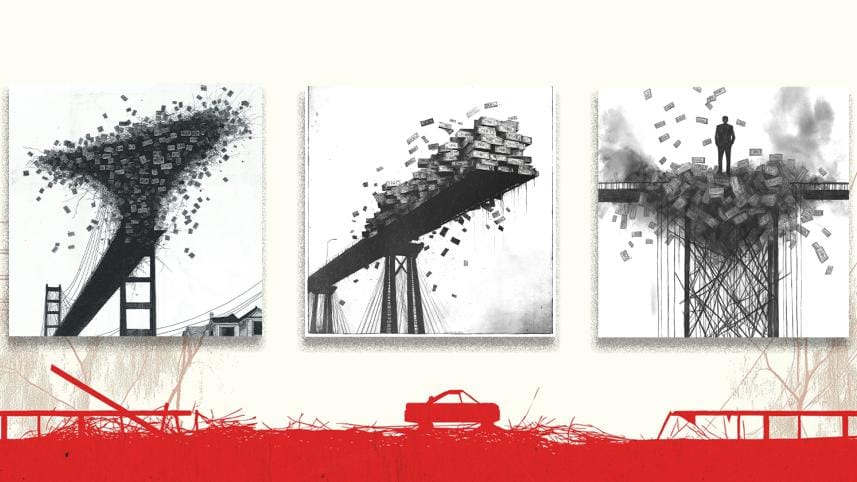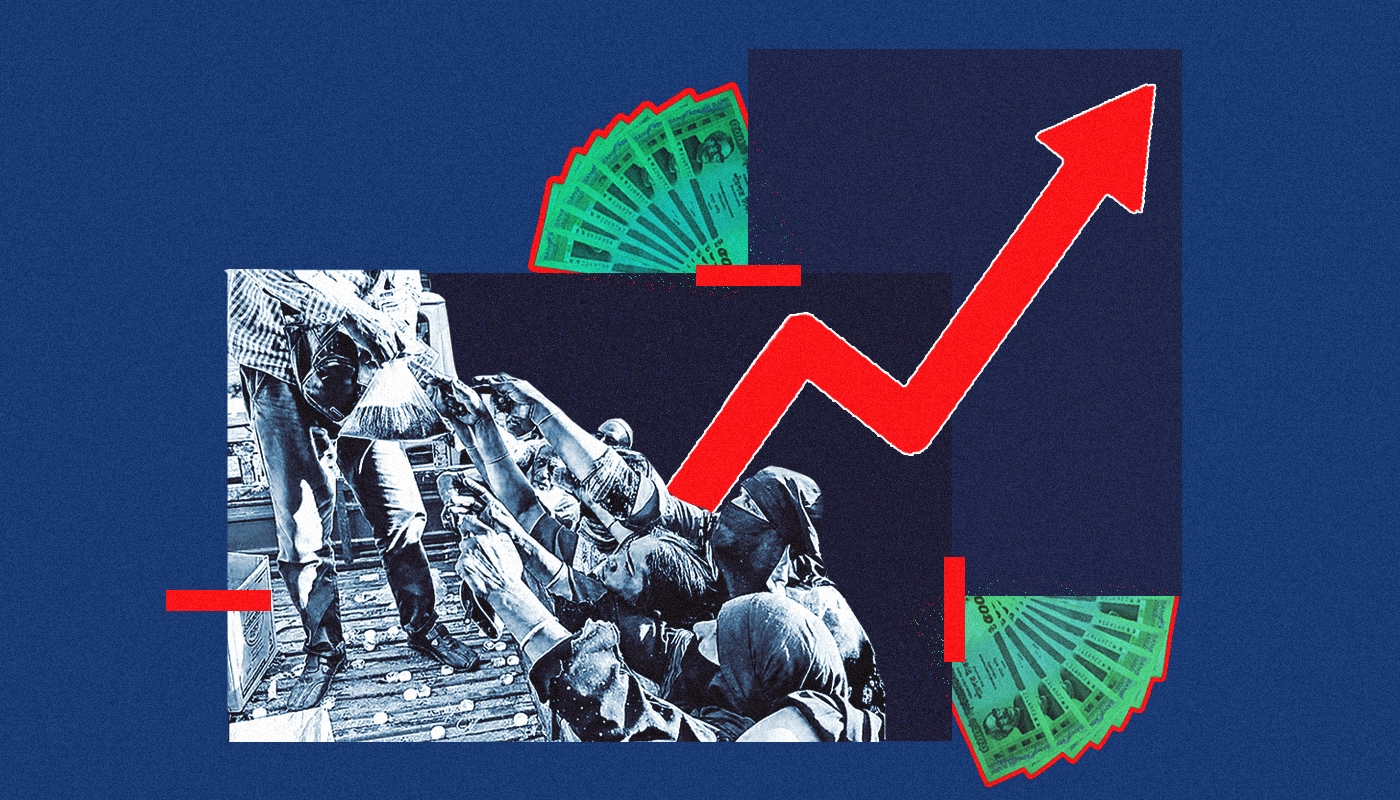A guide to smuggling dreams and national nightmares

In the vast tapestry of human creativity, few heists match the sheer audacity of the Awami League's 15-year saga of economic escapades. It's as though the government took cues from Ocean's Eleven, but instead of Danny Ocean and his suave crew, we had a merry band of bureaucrats, politicians and their cronies, all playing fast and loose with public funds. The white paper report on $234 billion (approximately Tk 28 lakh crore) in smuggled money isn't just a document; it's the script of a dystopian drama where "the tumour" of corruption metastasised across the economy, creating villains more cunning than Moriarty and institutions more fragile than Humpty Dumpty.
Jerry Maguire's famous line seems to have been taken as gospel by corrupt leaders and business moguls, who perfected the art of money laundering during the Awami League's tenure. According to the white paper, an average of Tk 1.8 lakh crore was smuggled abroad annually—enough to buy private islands, fund covert lunar missions or, more realistically, snap up overpriced condos in Dubai. Bangladeshis now own 532 properties in Dubai, worth a cool $375 million, which makes one wonder: is Bangladesh exporting labour or landlords?
Meanwhile, the Malaysia My Second Home programme welcomed more than 3,600 Bangladeshis, proving that while the poor migrate for better opportunities, the rich migrate for better villas. These transactions read like chapters from The Great Gatsby, where extravagance and deceit coexist in splendid harmony. But unlike Jay Gatsby's mysterious fortune, this loot comes with a paper trail—albeit one guarded by layers of bureaucratic misdirection.
Banks have been called the lifeblood of economies, but during this regime, they morphed into black holes, swallowing Tk 6.75 lakh crore in distressed loans. That's enough to build more than 13 metro rails or 22 Padma Bridges—or, in the true satirical spirit, one really long bridge to nowhere. Like Littlefinger from the Game of Thrones, the regime's players used banks not to build but to destabilise, enriching themselves while the kingdom crumbled.
These "distressed loans" weren't just numbers; they were lifelines for a select few oligarchs. Loans were disbursed with the generosity of Santa Claus, except the gifts were misappropriated funds, and the recipients were neither naughty nor nice—just connected.
Remember The Truman Show, where everything was a perfectly crafted illusion? That's precisely how the previous regime approached development projects. Roads, bridges, and hospitals became vanity projects, bloated with unnecessary costs and laced with bribes. It's almost poetic how money flowed like champagne at Gatsby's parties—except it wasn't enjoyed by the citizens who footed the bill.
Even the Annual Development Programme (ADP) was a masterpiece of creative accounting. Tk 7.2 lakh crore was spent over 15 years, with Tk 1.61 lakh crore to 2.8 lakh crore of it just wasted and looted. This wasn't development, it was performance art, a Kafkaesque nightmare where bridges connected not cities but offshore accounts.
If the banking sector was a black hole, the stock market was its rowdy cousin. Tk 1 lakh crore was embezzled through IPO fraud and placement scams, orchestrated by a shadowy cabal of politicians, bureaucrats, and "entrepreneurial" visionaries. These schemes rivalled Jordan Belfort's exploits in The Wolf of Wall Street.
This isn't just fraud—it's artistry. It takes a genius to convince an entire nation that the stock market is a viable investment while you quietly pocket the proceeds.
In 1984, George Orwell described a world where truth was malleable, and facts were twisted to serve the ruling party. The Awami League apparently took this as a blueprint, manipulating GDP and inflation statistics to paint a rosy picture. The Bangladesh Bureau of Statistics (BBS) became the Ministry of Truth, churning out data that would make even Big Brother blush.
Meanwhile, corruption flourished unchecked. Bribes were no longer local transactions but global ventures. Funds once used to fuel the shadow economy at home were now smuggled abroad, funding lifestyles more lavish than Crazy Rich Asians. The report calls this phenomenon a "malignant tumour," but perhaps it's more akin to Voldemort—an ever-present, parasitic force sucking the life out of the nation.
If Charles Dickens were alive today, he might rewrite A Tale of Two Cities as A Tale of Two Classes: one that tightened its belt and another that loosened its purse strings abroad. The white paper reveals how capitalism birthed oligarchs who manipulated policy, entrenched corruption, and hoarded wealth overseas.
Imagine Walter White in Breaking Bad, but instead of cooking meth, he's cooking up development budgets. The white paper reveals how inflated project costs were systematically looted, with money laundered through shell companies and overseas investments. Every construction project became a criminal enterprise, and every politician a Gustavo Fring, a respectable façade hiding a sinister core.
As we sift through this economic rubble, the interim government faces a Herculean task: restoring integrity to institutions gutted by corruption. But let's not kid ourselves. There will be no sweeping reforms overnight. Instead, we're in for a gritty reboot, where every move is calculated, and every step forward is hard-earned.
The white paper ends with a plea for political will, but one must wonder: is will alone enough to undo 15-plus years of systemic plunder? Perhaps the answer lies not in politics but in public vigilance. For now, though, the Tk 28 lakh crore smuggled remains a testament to a regime that prioritised greed over governance, corruption over competence, and illusion over integrity.
Like all great tragedies, this saga offers a glimmer of hope. The exposure of these crimes marks a turning point—a chance for redemption. But the road ahead is long, winding, and riddled with potholes, many of which were paid for with our stolen money.
So here's to the future—a cleaner, fairer, and more transparent Bangladesh. And to the past? Well, that's best left as a cautionary tale. Let's just hope the next generation writes a different story, one where the villains are vanquished, and the heroes don't need offshore accounts.
H.M. Nazmul Alam is lecturer at the Department of English and Modern Languages of the International University of Business, Agriculture and Technology (IUBAT). He can be reached at nazmulalam.rijohn@gmail.com.
Views expressed in this article are the author's own.
Follow The Daily Star Opinion on Facebook for the latest opinions, commentaries and analyses by experts and professionals. To contribute your article or letter to The Daily Star Opinion, see our guidelines for submission.




 For all latest news, follow The Daily Star's Google News channel.
For all latest news, follow The Daily Star's Google News channel. 


Comments